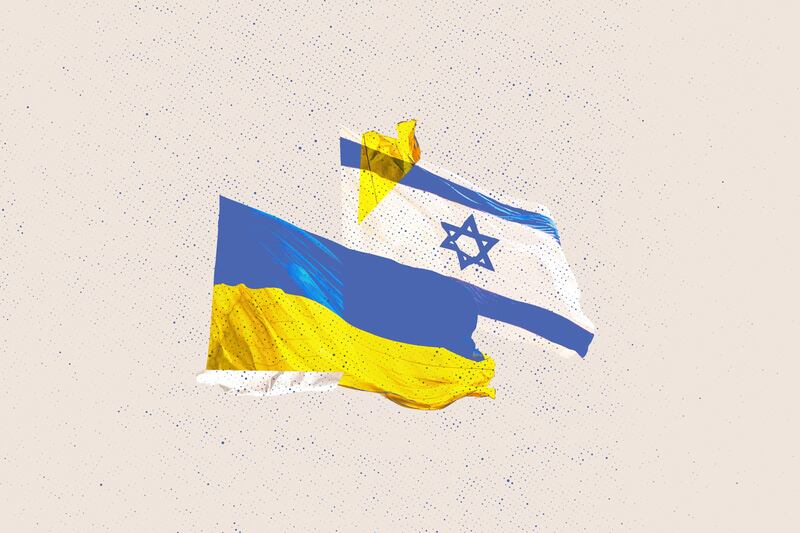A common Jewish joke that explains the theme of many of our holidays goes: “They tried to kill us. We survived. Let’s eat.”
Jewish social memory is imbued with this Darwinian reality, as scenes from Israel show this week.
Israelis of all ages and creeds made their annual pilgrimage to Har Herzl — Israel’s equivalent of Arlington National Cemetery — to pay their respects to the nearly 25,000 men and women who fought and died in defense of the state.
Remembrance Day, or Yom HaZikaron, ended Wednesday evening.
The following night, atop a usually tranquil mountain in western Jerusalem, Israelis observe Independence Day, or Yom Ha’atzmaut, a time of raucous and joyous celebration. Amid the gravesites of former prime ministers, presidents and early Zionist leaders, fireworks explode across the ancient city, signaling the end of mourning.
To an outside observer, this all might seem rather odd. However, for a nation about the size of New Jersey, in which virtually everyone knows someone impacted by war and terrorism, it makes perfect sense.
Joe Rogan recently shared on his podcast a story about his former kickboxing coach, an Israeli named Shuki. Visiting Shuki’s house for dinner one night, Rogan found the family celebrating, dancing and singing, and he asked what made them so happy.
“When you are in Israel, every day you could you die, you don’t know what is going to happen,” Shuki told Rogan. “(T)here is constant conflict, you are surrounded by all these Arab states, any day you can die, so everybody is just in the mood for party-party-party, because when you are alive, you are happy.”
Jewish history — of which the state of Israel represents but a sliver of our recent journey — is one of survival treading. This is also playing out in Ukraine, another nation embattled in its own fight for survival today.
Ukraine, which has lived in the shadows of a revanchist Russia seeking to revive its former glory, is relearning the price of independence three decades after it gained it. And it does so with a large Jewish population hearing conspiracy theories that bounce around Vladimir Putin’s hall of mirrors, such as that Adolph Hitler “had Jewish blood” and that Ukraine, which has a Jewish prime minister and president, must be “denazified.”
Such pronouncements, even when clearly false, are chilling. No chapter in our story is more ever-present than the Holocaust, despite the world’s bold promise “Never again.”
Although many in the West are unaware, Ukrainians experienced a genocide that predates the Holocaust: the Holodomor (“extermination from hunger”) in which nearly 4 million perished because of Josef Stalin’s policies. Little changed for Ukrainians throughout the Cold War; they lived under the thumb of the Soviet Union until declaring independence in 1991. Thirty years is not a long time to be in the business of nation-building, and Ukrainians are aware that the lessons of the past, especially those related to the Holocaust, have yet to be fully digested by the world.
I spoke this week over Zoom with a Ukrainian friend I met in graduate school in Canada. A historian, he had been studying Russian imperialism. Two rockets hit Kyiv during our conversation.
In green camouflage and sporting a hefty beard, it was hard to recognize the Max I knew. I remembered the clean-shaven, 20something: the doctoral candidate, not the soldier. However, days prior to Russia’s invasion, he had volunteered in the territorial army as an infantryman stationed in Kyiv.
Max no longer remembers the days of the week or time of the month. Everything blurs together. Daily life revolves around the brutal logic of war: preparedness, defense, survival. He sleeps four hours, goes on high-alert guard duty for two. Rinse and repeat.
Fortunately, Max’s section of the home front has avoided the worst of the fighting now unfolding in the east. One time his unit was told the Russians were coming in the hour. “So we get prepared and then the hour passes. There’s no Russian tanks.”
Morning comes and nothing changes. Turns out “the military brigade in front of us was supposed to pull back so that we could join the battle, but they didn’t want to. They said, ‘Those Russians are our prey, and we’re not going to share it.’ There’s a lot of dark jokes here.”
Since the Ukrainians have successfully defended the city, life is slowly returning. Now every eight days Max is allowed a day off. “We can go home and spend time at home for a whole 24 hours. That’s huge. Hopefully, something will change soon again.”
Indeed, things have begun to change. His wife and baby boy returned to Kyiv from western Ukraine days before we spoke.
Oddly enough, one class we took together examined genocide and war crimes. At the time, we were idealistic grad students ensconced in Canada pontificating about how the world should be. Now, five years on, he’s holed up in Kyiv keeping the city free.
To Max, the cries of “Never again” now seem reduced to “Never remember.” He considers the United Nations something akin to a joke.
“I am just waiting for May 8 (the U.N.’s day of remembrance for victims of World War II) to hear those ‘Never again’ statements,” he told me.
He’s not the only person thinking this way. As NPR’s Scott Simon recently said, “Whether in Bosnia, Rwanda, Xinjiang, Bucha, Kharkiv or Mariupol, ‘Never again’ seems to happen again and again.”
It is something that Jewish people the world over remember this week with particular poignancy for those with connections to Ukraine. “They tried to kill us. We survived. Let’s eat” is a joke only for the survivors. May the Jews of Ukraine one day find humor in the words again.
Ari David Blaff is a Canadian freelance journalist. His writings have appeared in National Review, Tablet, Quillette and the Institute for Family Studies.

